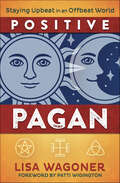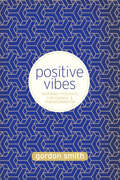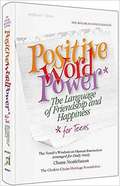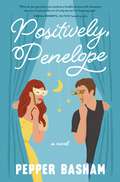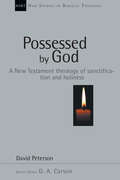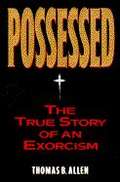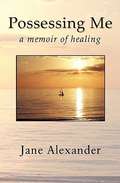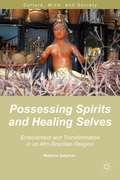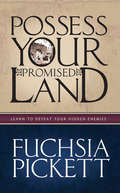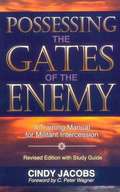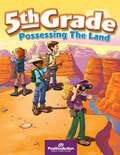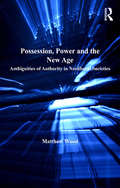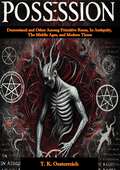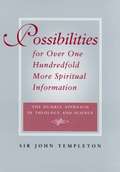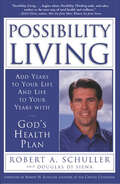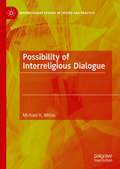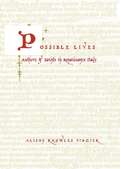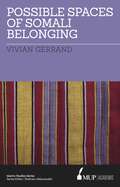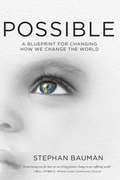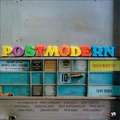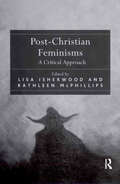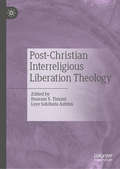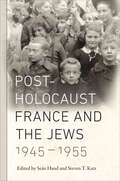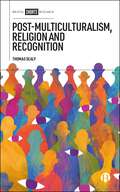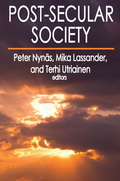- Table View
- List View
Positive Pagan: Staying Upbeat in an Offbeat World
by Lisa WagonerSpells, Meditations & Rituals for Greater Happiness, Fulfillment & ConfidenceLearn how to radiate positive energy, even when you've been through an unjust amount of pain and hardship, with this inspiring book by Pagan writer Lisa Wagoner. In these turbulent times, keeping a sense of positivity can seem like an unattainable feat, but this book offers powerful support through an extensive collection of meditations, spells, correspondences, and rituals.Positive Pagan shows you how to build tenacity, find inward and outward balance, and share a positive perspective with others. Lisa provides techniques that are designed to help you develop a core of positivity that stays with you through every experience—good and bad. With this book, you'll have all the tools and confidence needed to handle tough times and spread positivity in the world.
Positive Vibes: Inspiring Thoughts for Change and Transformation
by Gordon SmithA beautiful book of inspiring and uplifting thoughts to enrich your daily life, from much-loved, world-famous medium and bestselling author Gordon Smith.Sometimes this life can be very difficult and we don't always have the answers as to why, but somewhere inside all of us is an inner power that can give us the strength to go on in spite of what hardships our life throws at us. That power is our inner spirit.Gordon Smith has delved into that deep inner strength many, many times in his own life and has found renewed energy just by being positive in the face of adversity. In this beautiful collection of uplifting thoughts to inspire you in your everyday life, Gordon guides you to a place where transformation and healing will flood into your life as you connect to your own inner spirit and return to the joy that is your birthright.
Positive Word Power: The Language Of Friendship And Happiness: For Teens: The Torah Wisdom On Human Interaction Arranged For Daily Study
by Chana Nestlebaum Shaindy AppelbaumFriends, classmates, parents, siblings... they're what we cherish most in life. Now you can learn how to protect your greatest treasure from damage, keeping your relationships shining bright. It's all in the power of the words you speak. Learn the answers to such vital everyday questions as: Is a joke always funny? Is criticism always constructive? Does praise always build others up? How can I deal kindly with someone who annoys me? What if someone is not my type? How should I express anger? In 2009, The Chofetz Chaim Heritage Foundation produced Positive Word Power, based on "The Power of Words" by Rabbi Zelig Pliskin, which shone a bright light on the issue of ona'as devarim — hurting others with words. This daily learning sefer has been taken up by thousands of Jewish men and women who have learned how to recognize and change those thoughts and character traits that spur nice people to say hurtful things. Now The Chofetz Chaim Heritage Foundation brings these priceless lessons to you, teenage readers, through practical scenarios, strategies and discussion questions that reflect the unique challenges of your life. Positive Word Power for Teens will sensitize you to the impact of words you use and hear every day and help you shed negative habits. Through our words, each of us has the power to paint for ourselves a bright and loving world, or a dark and lonely one. With an investment of just a few minutes a day, you can learn how to choose the beautiful hues of kindness and sensitivity, and paint a world you'll be happy to live in today and for the rest of your life!
Positively, Penelope
by Pepper BashamThe world could do with a little more kindness and positivity and random acts of singing, don&’t you think?Dear Reader, My name is Penelope, and while I may not be a real-life princess, I&’ve been told I possess a certain fairy-tale heroine quality. I wield optimism as my weapon of choice, don amazing shoes and vintage hats whenever possible, and speak in musical references. All of which perfectly qualifies me to succeed in my new role as a marketing intern at the historic Darling House theater on the island of Skymar.Only . . . it seems this internship position is going to be a LOT bigger than I thought. The Gray family, who owns the theater, has been stuck in a rut of darkness ever since the loss of their matriarchs. Now all that&’s left is a dying theater, a reclusive grandfather, three siblings, and an adorable seven-year-old girl who desperately needs some pixie-dust magic.So that&’s what this story is about. My plans to save the theater! (Plans that, somehow, keep being stolen by a local competitor.) And an anonymous online theater troupe. And two single brothers who may be vying for this American girl&’s heart . . . until they&’re not (or maybe they just want me for my ideas too). And a dream job offer that will require me to make a truly heart-wrenching decision. I may not excel at finishing stories, but I promise to see this one through to its happily ever after.Positively,Penelope&“What do you get when you combine a lovable heroine with characters who have mastered the art of witty banter? A charming read.&” —Sheila Roberts, USA TODAY bestselling authorWitty, hilarious, and heartwarming contemporary romanceA sweet, kisses-only romanceAn epistolary novel written mostly in emails and textsStand-alone novel, but a companion to Authentically, IzzyBook length: approximately 110,000 wordsIncludes discussion questions for book clubs
Possessed by God: A New Testament theology of sanctification and holiness (New Studies in Biblical Theology #Volume 1)
by David G. PetersonIn this New Studies in Biblical Theology volume, David Peterson challenges the common assumption that the New Testament views sanctification as primarily a process. He argues that its emphasis falls upon sanctification as a definitive event, "God's way of taking possession of us in Christ, setting us apart to belong to him and to fulfill his purpose for us." Simply to identify sanctification with growth and holiness, he contends, obscures the emphasis and balance of New Testament teaching and creates unrealistic expectations. Throughout this study Peterson builds his case on the careful exegesis of relevant passages, with a keen eye for the pastoral implications of his findings. Addressing key issues in biblical theology, the works comprising New Studies in Biblical Theology are creative attempts to help Christians better understand their Bibles. The NSBT series is edited by D. A. Carson, aiming to simultaneously instruct and to edify, to interact with current scholarship and to point the way ahead.
Possessed: The True Story of an Exorcism
by Thomas B. AllenA priest's diary, hidden for forty years in a mysterious locked room of a St. Louis mental hospital, has recently come to light, giving us the best documented exorcism in history.
Possessing Me: A Memoir of Healing
by Jane AlexanderThe author describes in exacting detail, her eventual path to healing from childhood neglect and abandonment, post traumatic stress disorder and manic depression, as she discovers the secret to lasting happiness.
Possessing Spirits and Healing Selves
by Rebecca SeligmanSpirit possession involves the displacement of a human's conscious self by that of a powerful other - a spirit, god, or demon - who temporarily occupies the human's body. To many, spirit possession is quintessentially exotic, a novelty, an example of the ways in which "others" are fundamentally different. In this book, Seligman shows that, far from being exotic and "other," spirit possession mediumship represents a privileged site for understanding a number of fundamental aspects of human experience - especially those involved with interactions among meaning, embodiment, and subjectivity. Using a diverse set of ethnographic, psychological, and biological data gathered during fieldwork among spirit possession mediums of the Candomble religion in Northeastern Brazil, she explores how everyday and religious practices and meanings shape and interact with the bodily experiences and psychophysiological states of Candomble mediums, both before and after their initiations, and how such interactions shape their experiences of selfhood. "
Possessing Your Promised Land: Learn to defeat your hidden enemies
by Fuchsia PickettKILL ALL THE KINGS IN YOUR LIFE WITH LOVE...HIS LOVE!There can only be one throne in your life, and King Jesus needs to be seated there! During your life, you can possess all kinds of spiritual territory, but you must first get rid of thirty-one "self" kings that want to lay claim to His throne. Dr. Fuchsia Pickett shares a life message that will open the gates of your soul through obedience. She shows you how to unlock the gates of your spirit with faith! If you want to possess the land that god promised, you will have to think and act as if it is yours right now. Don't give your self a vote on any issue. Discover why the Holy Spirit wants the last word, and see what happens when His love overthrows all the "self" kings in your life. Let God's promises become a reality n your life!
Possessing the Gates of the Enemy: A Training Manual for Militant Intercession (Study Guide Included)
by Cindy JacobsForeword by C. Peter Wagner, Fuller Theological Seminary, Pasadena, California. I know of no other book like this one. In the years that I have been researching prayer I have been carefully building a bibliography of significant books on the subject, both classic and contemporary. None of the 39 books so far on my list so much as approaches the content of Possessing the Gates of the Enemy. Possessing the Gates of the Enemy is a book that I not only recommend to all my friends, but require my students in Fuller Seminary to read.
Possessing the Land: 5th Grade
by Cherie NoelFifth grade students get to learn about Bible characters like Daniel, Moses, Abraham, Jacob among others.
Possession, Power and the New Age: Ambiguities of Authority in Neoliberal Societies (Theology and Religion in Interdisciplinary Perspective Series)
by Matthew WoodThis book provides a new sociological account of contemporary religious phenomena such as channelling, holistic healing, meditation and divination, which are usually classed as part of a New Age Movement. Drawing on his extensive ethnography carried out in the UK, alongside comparative studies in America and Europe, Matthew Wood criticises the view that such phenomena represent spirituality in which self-authority is paramount. Instead, he emphasises the role of social authority and the centrality of spirit possession, linking these to participants' class positions and experiences of secularisation. Informed by sociological and anthropological approaches to social power and practice, especially the work of Pierre Bourdieu and Michel Foucault, Wood's study explores what he calls the nonformative regions of the religious field, and charts similarities and differences with pagan, spiritualist and Theosophical traditions.
Possession: Demoniacal and Other Among Primitive Races, In Antiquity, The Middle Ages, and Modern Times
by T. K. OesterreichPossession: Demoniacal and Other Among Primitive Races, In Antiquity, The Middle Ages, and Modern Times by T. K. Oesterreich is a comprehensive and scholarly exploration of the phenomenon of possession throughout human history. This classic work, first published in the early 20th century, offers an in-depth analysis of how different cultures and eras have understood and interpreted the concept of possession, whether seen as a form of divine inspiration, a psychological disorder, or a manifestation of demonic influence.Oesterreich, a distinguished philosopher and psychologist, meticulously examines accounts of possession from ancient times through the Middle Ages and into the modern era, drawing on a vast array of sources, including religious texts, historical records, and ethnographic studies. His study spans the globe, considering how various societies—ranging from tribal communities to classical civilizations and medieval Europe—have responded to and attempted to explain cases of possession.Possession delves into the different forms possession has taken, from shamanic trance states and spirit possession in indigenous cultures to the demoniacal possessions documented by the Church during the Middle Ages. Oesterreich also explores the psychological dimensions of possession, considering how mental illness and cultural beliefs have shaped the interpretation of these extraordinary experiences.This book is not only a historical account but also a critical analysis of the enduring fascination with possession and the human need to understand the mysterious forces that seem to control or influence individuals against their will. Oesterreich’s balanced approach considers both the supernatural explanations and the psychological underpinnings of possession, making this work a valuable resource for scholars of religion, psychology, anthropology, and history.Possession remains a definitive study on the subject, offering readers a rich and nuanced understanding of one of humanity’s most intriguing and unsettling phenomena. T. K. Oesterreich’s work continues to be an essential reference for anyone interested in the intersection of culture, religion, and the human psyche.
Possibilities for Over One Hundredfold More Spiritual Information: The Humble Approach in Theology and Science
by Sir John TempletonThus Sir John Templeton challenges the reader to apply the same energy that has been devoted to scientific inquiry to the pursuit of spiritual information. The world is at a state of unprecedented technical expertise, but why has our knowledge and faith in our own spirituality stalled and become obsolete in recent times? Possibilities for Over One Hundredfold More Spiritual Information seeks to address this question. It points out that our spiritual knowledge would also have the capacity to increase dramatically if we were to open our minds to the endless possibilities that await us in terms of our spiritual lives. These include altruistic love for all people, new knowledge of the Divine, and a greater sense of our place in the universe. In order for us as human beings to take advantage of all of the spiritual gifts that we have been given, we need to be open and receptive to our individual spiritual natures, and to open ourselves to the limitless spiritual possibilities available to us. The book acknowledges the ancient scriptures and thinkers who have guided us for centuries. Vastly expanded research and the use of scientific method would only enhance our understanding of the wisdom contained within these wise teachings. The benefits of extending our spiritual knowledge might, in fact, exceed the benefits we have realized thus far from scientific and medical advances. Possibilities for Over One Hundredfold More Spiritual Information seeks to reawaken our desire for spiritual knowledge pushed aside so long ago in our quest for scientific knowledge. When these fields work together, the world will reap greater rewards that we can ever imagine.
Possibility Living: God's Health Plan
by Robert A. Schuller Douglas Di SennaIn this guide for spirit, mind, and body, internationally known minister Robert A. Schuller and natural health specialist Douglas Di Siena weave scripture, spirituality, natural health advice, and inspiring true-life stories together in a practical, innovative approach to living wholly, healthfully, and happily. By taking positive steps, such as eating a natural diet, fasting, and praying, you can tap into your innate power for possibility living, remaining open to the voice of God in your life as you nurture your whole being.
Possibility of Interreligious Dialogue (Interreligious Studies in Theory and Practice)
by Michael H. MitiasIs dialogue between the major religions of the world possible? If it is possible, under what conditions? In this book, Michael H. Mitias argues that it is possible provided various conditions are met. These conditions include mutual respect, mutual understanding, and God-centeredness. First, how can a religion that is unusually complex—composed of a doctrine founded in a unique divine revelation, a leadership class of theologians, teachers, clergy, and administrators, and a community across global cultures—show uniform respect to another religion? How can a complex institution like a religion truly understand another religion? Third, can the different religions worship the same God if their conceptions of God are based on their unique doctrines? Mitias addresses these questions and argues that it is possible for religions to respect and understand one another. Further, he argues that the different conceptions of God are necessarily founded in a belief in the existence of a transcendent, infinite, and wise being.
Possible Lives: Authors and Saints in Renaissance Italy
by Alison Knowles FrazierPossible Lives uses the saints'lives written by humanists of the Italian Renaissance to explore the intertwining of classical and religious cultures on the eve of the European Reformation. The lives of saints were among the most reproduced and widely distributed literatures of medieval and early modern Europe. During the century before the Reformation, these narratives of impossible goodness fell into the hands of classicizing intellectuals known as humanists. This study examines how the humanist authors received, criticized, and rewrote the traditional stories of exemplary virtue for patrons and audiences who were surprisingly open to their textual experiments. Drawn from a newly constructed catalog of primary sources in manuscript and print, the cases in this book range from the lure of martyrdom as the West confronted Islam to the use of saints'lives in local politics and the rhetorician's classroom. Frazier discusses the writers'perceptions of historical sanctity, the commanding place of the mendicant friars, and one unique account of a contemporary holy woman.Possible Lives shows that the classical Renaissance was also a saintly Renaissance, as humanists deployed their rhetorical and philological skills to "renew the persuasive force of Christian virtue" and "save the cult of the saints." Combining quantitative and anecdotal approaches in a highly readable series of case studies, Frazier reveals the contextual richness of this little-known and unexpectedly large body of Latin hagiography.
Possible Spaces of Somali Belonging (Islamic Studies Series)
by Vivian GerrandWhat happens when Somalis migrate to countries with which they have few cultural ties? What helps Somalis to feel at home in their new Western countries of residence? Possible Spaces of Somali Belonging explores representations of Somali resettlement to understand the mechanics of contemporary belonging and the challenges faced by Western societies as they attempt to 'integrate' Somali migrants. How do particular representations contribute to or detract from Somali belonging? In the contexts of Australia and Italy-taken as case studies-Somalis are marginalised in different ways. With a multi-disciplinary approach, this book examines different forms of Somali representation in Australia and Italy that engender a sense of belonging and expands exclusive definitions of nationhood. Islamic Studies Series - Volume 21
Possible: A Blueprint for Changing How We Change the World
by Stephan BaumanWe need a better vision for saving the world. Across the world, people like you are rising up to fight poverty, oppression, and injustice--not just professionals, but bloggers, musicians, entrepreneurs, artists, homemakers, and advocates. People who refuse to accept the world as it is, who dare to believe change is possible. But we face a crisis of vision. We sense what needs to be done, but often we don't know how to do it. Without a better blueprint for doing good well, our moment in history will slip away. Stephan Bauman, president of a leading charity believes true change begins in the hearts and actions of ordinary people. In Possible, he presents clear and biblical thinking, powerful stories, and practical tools for sustainably impacting our workplaces, neighborhoods, villages, and cities. Possible is an eloquent and personal call to reconsider what it means to change ourselves so that we can change the world.From the Hardcover edition.
Post Modern Youth Ministry: Exploring Cultural Shift, Creating Holistic Connections, Cultivating Authentic Community
by Tony JonesThe rules have changed. Everything you believe is suspect. The world is up for grabs. Welcome to the emerging postmodern culture. A "free zone" of rapid change that places high value on community, authenticity, and even God--but has little interest in modern, Western-tinged Christianity. Postmodern Youth Ministry addresses these enormous philosophical shifts and shows how they're affecting teenagers.
Post-Christian Feminisms: A Critical Approach
by Lisa IsherwoodThis book explores the impact and contribution of post-theories in the field of Christian feminist theology. Post-theory is an important and cutting-edge discursive field which has revolutionized the production of knowledge in both feminism and theology. This book fills a gap by providing a text that can make authoritative statements on the use and status of post-theory in feminist theology, and secondly it makes an on-going contribution to the discourse of Christian feminist theology and its liberation agenda. Distinguished and established scholars contribute conclusive essays on the most recent and exciting developments in post-theory, feminism and theology.
Post-Christian Interreligious Liberation Theology
by Hussam S. Timani Loye Sekihata AshtonThis book explores the ideals of liberation theology from the perspectives of major religious traditions, including Islam, Christianity, Judaism, Buddhism, and the neo-Vedanta and Advaita Hindu traditions. The goal of this volume is not to explain the Christian liberation theology tradition and then assess whether the non-Christian liberation theologies meet the Christian standards. Rather, authors use comparative/interreligious methodologies to offer new insights on liberation theology and begin a dialogue on how to build interreligious liberation theologies. The goal is to make liberation theology more inclusive of religious diversity beyond traditional Christian categories.
Post-Holocaust France and the Jews, 1945-1955 (Elie Wiesel Center for Judaic Studies Series #2)
by Seán Hand Steven T KatzDespite an outpouring of scholarship on the Holocaust, little work has focused on what happened to Europe’s Jewish communities after the war ended. And unlike many other European nations in which the majority of the Jewish population perished, France had a significant post‑war Jewish community that numbered in the hundreds of thousands. Post-Holocaust France and the Jews, 1945–1955 offers new insight on key aspects of French Jewish life in the decades following the end of World War II.How Jews had been treated during the war continued to influence both Jewish and non-Jewish society in the post-war years. The volume examines the ways in which moral and political issues of responsibility combined with the urgent problems and practicalities of restoration, and it illustrates how national imperatives, international dynamics, and a changed self-perception all profoundly helped to shape the fortunes of postwar French Judaism.Comprehensive and informed, this volume offers a rich variety of perspectives on Jewish studies, modern and contemporary history, literary and cultural analysis, philosophy, sociology, and theology.With contributions from leading scholars, including Edward Kaplan, Susan Rubin Suleiman, and Jay Winter, the book establishes multiple connections between such different areas of concern as the running of orphanages, the establishment of new social and political organisations, the restoration of teaching and religious facilities, and the development of intellectual responses to the Holocaust. Comprehensive and informed, this volume will be invaluable to readers working in Jewish studies, modern and contemporary history, literary and cultural analysis, philosophy, sociology, and theology.
Post-Multiculturalism, Religion and Recognition
by Thomas SealyThis book examines the evolving relationship between multiculturalism, religion and diversity in Western Europe, proposing a shift towards a post-multicultural approach to address religious and secular pluralism. The author responds to criticisms of multiculturalism's approach to public religion, including perceived group reification and limited focus on intra-group domination, gender and sexuality equalities. Through a critical dialogue between multicultural theory and political theology, the book offers an original framework for post-multicultural recognition. Enriching multiculturalism by integrating religious reason and institutional pluralism, this book contributes crucial new insights to debates on religion, equality and diversity in public life.
Post-Secular Society
by Gustaaf GeeraertsPost-Secular Society argues for several characteristics of the secular: the experience of living in a secular age and the experience of living without religion as a normal condition.Religion in the West is often seen as marked by both innovation and disarray. In spite of differing approaches and perspectives of secularization, rational choice and de-secularization, many scholars agree that the West is experiencing a general "resurgence" of religion across most Western societies.Post-Secular Society discusses the changes in religion related to globalization and New Age forms of popular religion. The contributors review religion that is rooted in the globalized political economy and the relationship of post-secularism to popular consumer culture. Also reviewed is innovative discourse as a religious belief system, theories of the post-secular, religious, and spiritual well-being, and healing practices in Finland and environmentalism. This paperback edition includes a new preface by Peter Nynas.
